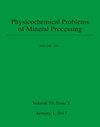Potassium chloride recovery from mechanically activated microcline through the chlorination roasting and leaching route
IF 1.2
4区 工程技术
Q4 CHEMISTRY, PHYSICAL
引用次数: 0
Abstract
In this study, effects of mechanical activation in the chlorination roasting and water leaching route known as CaCl2 process and developed for the production of potassium chloride (KCl) from potassium feldspar ores were studied. A microcline containing K-feldspar ore with 10.89% K2O was first intensively dry milled by a planetary ball mill and mixed with calcium chloride (CaCl2) and then roasted at temperatures up to 1000 °C to obtain KCl that will be finally dissolved by the water leaching. Potassium recovery by water leaching increased rapidly up to 800 °C. At higher temperatures, the recovery decreased fast due to the evaporation of KCl. According to the K recovery values per unit energy consumed, the optimum roasting temperature was determined as 750 °C and the milling time was 15 min. It was concluded that intensive milling causes mechanical activation of the microcline to reduce the chlorination roasting temperature, which triggers a rise in the K recovery by the water leaching.采用氯化焙烧浸出工艺回收机械活化微斜石中氯化钾
研究了机械活化对钾长石矿氯化焙烧水浸工艺(CaCl2工艺)的影响。先用行星球磨机对含钾长石矿(含K2O 10.89%)的微斜长石进行密集干磨,并与氯化钙(CaCl2)混合,然后在高达1000℃的温度下焙烧得到KCl, KCl最终被水浸溶解。当温度达到800℃时,水浸钾回收率迅速提高。在较高的温度下,由于KCl的蒸发,回收率下降得很快。根据单位能量K回收率,确定了最佳焙烧温度为750℃,磨矿时间为15 min。结果表明,强化磨矿使微斜岩机械活化,降低了氯化焙烧温度,从而提高了水浸K回收率。
本文章由计算机程序翻译,如有差异,请以英文原文为准。
求助全文
约1分钟内获得全文
求助全文
来源期刊

Physicochemical Problems of Mineral Processing
CHEMISTRY, PHYSICAL-MINING & MINERAL PROCESSING
自引率
6.70%
发文量
99
期刊介绍:
Physicochemical Problems of Mineral Processing is an international, open access journal which covers theoretical approaches and their practical applications in all aspects of mineral processing and extractive metallurgy.
Criteria for publication in the Physicochemical Problems of Mineral Processing journal are novelty, quality and current interest. Manuscripts which only make routine use of minor extensions to well established methodologies are not appropriate for the journal.
Topics of interest
Analytical techniques and applied mineralogy
Computer applications
Comminution, classification and sorting
Froth flotation
Solid-liquid separation
Gravity concentration
Magnetic and electric separation
Hydro and biohydrometallurgy
Extractive metallurgy
Recycling and mineral wastes
Environmental aspects of mineral processing
and other mineral processing related subjects.
 求助内容:
求助内容: 应助结果提醒方式:
应助结果提醒方式:


